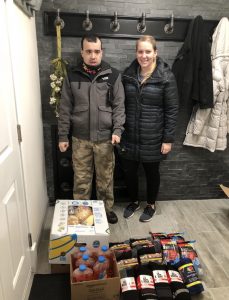Blog
DSP & HCP Recognition Week: The Professionals Many Loved Ones Count On
Frontline Workers, Thank You For All You Do
September 12-18 is Direct Support Professional (DSP) and Home Care Provider (HCP) Recognition Week!
Those who work on the frontline spend countless hours giving support to those with developmental and other disabilities, those who are aging, and those who have a temporary or permanent injury. Helping one get out of bed, distributing medications, providing transportation to necessary places (school, work, doctor’s appointments), assistance with toileting/showering, cooking, and cleaning are just some (but not nearly all) of the ways a DSP/HCP can help one live a typical life. In the school setting DSPs (also known as paraprofessionals) are crucial for many students to access their education.
To all of you who work on the frontline day after day – YOU are appreciated. Thank you for what you do not just this week, but all 365 days of the year!

Finding a Good Fit
For those who decide to find a paid HCP/DSP for their loved one – they will want to select someone they can trust to keep their loved one safe and find that person from a place that is trusted.
Cynthia Mahar, Executive Vice President said, “Community Crossroads contracts with over twenty-two service provider agencies who are always recruiting for Direct Support Professional and Home Care Providers. In today’s era of workforce shortages, dedicated and committed DSPs are in demand more than ever at any time in our system’s history. Although families can access Indeed.com or Care.com to recruit DSPs, many individuals in Family Directed Services have had success hiring family members, friends, and neighbors. With the reality of the workforce shortage, this is becoming more important and common…Providing kind, caring, and competent support to someone who’s life depends on you, is a noble and valuable profession.”
Sheryl Pellerin has found support for her son Brandyn throughout the years. Sheryl said anyone that comes in to support her son becomes “part of the family” because of how well they will get to know Brandyn and herself. For Sheryl, finding a DSP through word-of-mouth is effective in finding someone she can trust. By finding someone she and her son can get along with, and that understands the duties of working on the frontline – she ensures that Brandyn receives the care he deserves.

[“This is a donation we made through BranTheMan Charity to the House of Mercy in Lawrence, MA which is a shelter for the homeless” – Sheryl Pellerin]
The Unpaid Caregiver
It is common for the caretakers to be family members, spouses or friends whether paid or unpaid. This arrangement may be a choice or out of necessity when paid professionals outside the family aren’t available. According to the National Alliance for Caregiving (NAC), the number of Americans providing unpaid care has increased in the past several years. 43.5 million Americans were providing unpaid care to a loved one in 2015 – 2020’s report states that amount has risen to 53 million. Not only has there been an increase in the number of people giving care, 24% of those 53 million are caring for more than one individual. The growing shortage of paid DSP/HCP workers throughout our country that has been going on for decades has forced people to rely on family members/loved ones for their care. This may lead to unintended consequences for the caretakers such as employment disruption, changes in quality of life, and potentially their own declining health. According to the NAC, “6 out of 10 (61%) caregivers experience at least one change in their employment due to caregiving such as cutting back work hours, taking a leave of absence, receiving a warning about performance/attendance, among others.” In addition, NAC also reported last year that 21% of family caregivers have reported that their own health is between fair and poor.
A Workforce Shortage
The shortage of DSPs and HCPs has become an issue both in New Hampshire, and throughout the entire nation. A recent report from the Community Support Network (CSNI) reported that there were 477 vacant Direct Support Professional positions throughout our state’s ten area agencies (and does not even include the high number of paraprofessionals needed in schools throughout our state). These vacancies represented more than 10% of the open positions at area agencies throughout NH. According to the American Association on Intellectual and Developmental Disabilities, it is estimated that nationally more than one million new direct support positions need to be filled by next year.
A recent article from the Concord Monitor states that currently in our state – a DSP/HCP makes less money than cashiers at corporate general retailers. Our state – and entire nation NEEDS to invest in this important line of work. Advocating for better pay, appropriate training and placing a higher societal value on these frontline workers is the only way to overcome these challenges.
As a community we must educate local and state legislators, school boards, and governing bodies about the issues that exist around workforce shortage. The type of support DSPs and HCPs give is critical to one’s quality of life, and it is crucial we take the opportunity to not only recognize these individuals, but to take necessary steps to advocate for them.